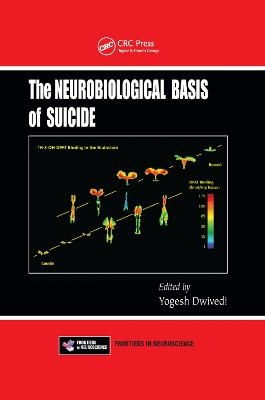
The Neurobiological Basis of Suicide
CRC Press (Verlag)
978-0-367-38119-6 (ISBN)
Psychological, psychosocial, and cultural factors are important in determining the risk factors for suicide; however, they offer weak prediction and can be of little clinical use. Interestingly, cognitive characteristics are different among depressed suicidal and depressed nonsuicidal subjects, and could be involved in the development of suicidal behavior.
The characterization of the neurobiological basis of suicide is in delineating the risk factors associated with suicide. The Neurobiological Basis of Suicide focuses on how and why these neurobiological factors are crucial in the pathogenic mechanisms of suicidal behavior and how these findings can be transformed into potential therapeutic applications.
Yogesh Dwivedi is with the Department of Psychiatry at the University of Illinois.
Diagnosis, Traits, States, and Comorbidity in Suicide. Neuroanatomy of Serotonergic Abnormalities in Suicide. Noradrenergic Dysfunction in Depression and Suicide. Gamma-Aminobutyric Acid Involvement in Depressive Illness: Interactions with Corticotropin-Releasing Hormone and Serotonin. Role of the Endocannabinoid System in the Neurobiology of Suicide. Stress–Diathesis Model of Suicidal Behavior. Do Serum Cholesterol Values and DST Results Comprise Independent Risk Factors for Suicide? Brain-Derived Neurotrophic Factor in Suicide Pathophysiology. Neuroimaging: High Risk States for Suicide. Gene–Environment Interaction and Suicidal Behavior. Genetic Factors and Suicidal Behavior. Approaches and Findings from Gene Expression Profiling Studies of Suicide. Epigenetic Effects of Childhood Adversity in the Brain and Suicide Risk. Genetics of Suicidal Behavior in Children and Adolescents. Neurobiology of Teenage Suicide. Suicidal Behavior in Pediatric Population: Neurobiology and the Missing Links in Assessing Risk among Patients with Bipolar Disorder. Suicide in Late Life. Intermediate Phenotypes in Suicidal Behavior: Focus on Personality. Toxoplasma gondii, the Immune System, and Suicidal Behavior. Peripheral Biomarkers for Suicide. Medication in Suicide Prevention: Insights from Neurobiology of Suicidal Behavior.
| Erscheinungsdatum | 24.09.2019 |
|---|---|
| Verlagsort | London |
| Sprache | englisch |
| Maße | 156 x 234 mm |
| Gewicht | 760 g |
| Themenwelt | Geisteswissenschaften ► Psychologie ► Allgemeine Psychologie |
| Geisteswissenschaften ► Psychologie ► Biopsychologie / Neurowissenschaften | |
| Medizin / Pharmazie ► Allgemeines / Lexika | |
| Medizin / Pharmazie ► Medizinische Fachgebiete ► Psychiatrie / Psychotherapie | |
| Naturwissenschaften ► Biologie ► Humanbiologie | |
| Naturwissenschaften ► Biologie ► Zoologie | |
| ISBN-10 | 0-367-38119-2 / 0367381192 |
| ISBN-13 | 978-0-367-38119-6 / 9780367381196 |
| Zustand | Neuware |
| Informationen gemäß Produktsicherheitsverordnung (GPSR) | |
| Haben Sie eine Frage zum Produkt? |
aus dem Bereich


